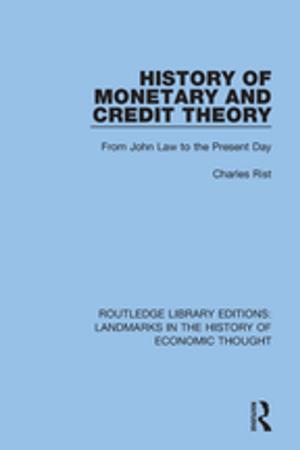China's New Public Health Insurance
Challenges to Health Reforms and the New Rural Co-operative Medical System
Nonfiction, Social & Cultural Studies, Social Science, Cultural Studies, Ethnic Studies| Author: | Armin Müller | ISBN: | 9781317230045 |
| Publisher: | Taylor and Francis | Publication: | November 25, 2016 |
| Imprint: | Routledge | Language: | English |
| Author: | Armin Müller |
| ISBN: | 9781317230045 |
| Publisher: | Taylor and Francis |
| Publication: | November 25, 2016 |
| Imprint: | Routledge |
| Language: | English |
Especially since the 2003 SARS crisis, China’s healthcare system has become a growing source of concern, both for citizens and the Chinese government. China’s once praised public health services have deteriorated into a system driven by economic constraints, in which poor people often fail to get access, and middle-income households risk to be dragged into poverty by the rising costs of care. The New Rural Co-operative Medical System (NRCMS) was introduced to counter these tendencies and constitutes the main system of public health insurance in China today. This book outlines the nature of the system, traces the processes of its enactment and implementation, and discusses its strengths and weaknesses. It argues that the contested nature of the fields of health policy and social security has long been overlooked, and reinterprets the NRCMS as a compromise between opposing political interests. Furthermore, it argues that structural institutional misfits facilitate fiscal imbalances and a culture of non-compliance in local health policy, which distort the outcomes of the implementation and limit the effectiveness of insurance. These dynamics also raise fundamental questions regarding the effectiveness of other areas of the comprehensive New Health Reform, which China has initiated to overhaul its healthcare system.
Especially since the 2003 SARS crisis, China’s healthcare system has become a growing source of concern, both for citizens and the Chinese government. China’s once praised public health services have deteriorated into a system driven by economic constraints, in which poor people often fail to get access, and middle-income households risk to be dragged into poverty by the rising costs of care. The New Rural Co-operative Medical System (NRCMS) was introduced to counter these tendencies and constitutes the main system of public health insurance in China today. This book outlines the nature of the system, traces the processes of its enactment and implementation, and discusses its strengths and weaknesses. It argues that the contested nature of the fields of health policy and social security has long been overlooked, and reinterprets the NRCMS as a compromise between opposing political interests. Furthermore, it argues that structural institutional misfits facilitate fiscal imbalances and a culture of non-compliance in local health policy, which distort the outcomes of the implementation and limit the effectiveness of insurance. These dynamics also raise fundamental questions regarding the effectiveness of other areas of the comprehensive New Health Reform, which China has initiated to overhaul its healthcare system.















